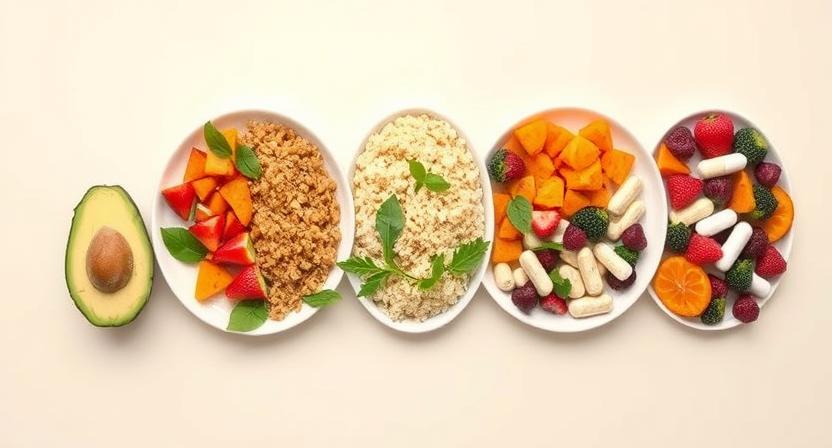Introduction to Nutrition Myths
In today’s world, where health advice floods social media and wellness blogs, it’s easy to fall for nutrition myths that promise quick fixes or miraculous results. From fad diets to misleading food labels, these misconceptions can derail your journey toward healthy eating. But what’s the truth behind these claims? This blog post dives deep into the most common diet misconceptions, busting myths with science-backed food facts to help you embrace balanced nutrition. Let’s separate fact from fiction and empower you to make informed choices for a healthier lifestyle.
Why Nutrition Myths Persist
Nutrition myths often stem from outdated science, marketing gimmicks, or oversimplified advice. The wellness industry thrives on catchy headlines and quick solutions, which can obscure food facts. For example, the rise of social media influencers promoting extreme diets has fueled diet misconceptions. These myths persist because they appeal to our desire for instant results. However, understanding the science behind healthy eating is key to cutting through the noise.
The Role of Misinformation
Misinformation spreads when complex topics like nutrition are reduced to soundbites. For instance, the idea that “carbs are bad” ignores the role of whole grains in balanced nutrition. Similarly, food companies may label products as “low-fat” to seem healthy, even if they’re packed with sugar. According to the Harvard T.H. Chan School of Public Health, focusing on nutrient quality over marketing claims is crucial for healthy eating.
Cultural and Social Influences
Cultural beliefs also shape nutrition myths. For example, some cultures glorify certain “superfoods” without evidence of their superiority. Social trends, like the demonization of gluten, further confuse consumers. These factors make it harder to discern food facts from fiction, reinforcing the need for critical thinking.
Common Nutrition Myths Debunked
Let’s tackle some of the most pervasive nutrition myths and uncover the truth behind them. By addressing these diet misconceptions, we can pave the way for balanced nutrition.
Myth 1: All Fats Are Unhealthy
One of the biggest diet misconceptions is that all fats are bad for you. While trans fats and excessive saturated fats can harm heart health, not all fats are created equal. Healthy fats, like those in avocados, nuts, and olive oil, are essential for brain function and hormone production. The truth? Incorporating healthy fats into your diet supports balanced nutrition and can even aid weight management when consumed in moderation.
Myth 2: Carbs Make You Gain Weight
Carbohydrates are often blamed for weight gain, but this is a gross oversimplification. Refined carbs, like white bread, can spike blood sugar, but complex carbs, such as quinoa and sweet potatoes, provide sustained energy. The key is choosing whole, unprocessed carbs as part of healthy eating. Cutting carbs entirely can lead to nutrient deficiencies, proving this nutrition myth wrong.
Myth 3: Detox Diets Cleanse Your Body
Detox diets and cleanses are marketed as ways to “flush toxins” from your system, but your body already has built-in detox organs: the liver and kidneys. There’s no scientific evidence that juice cleanses or extreme diets improve detoxification. Instead, focusing on food facts, like eating fiber-rich fruits and vegetables, supports your body’s natural processes far better than any fad cleanse.

Myth 4: Eating Late at Night Causes Weight Gain
The idea that eating after 8 p.m. leads to weight gain is another nutrition myth. Weight gain depends on your total calorie intake, not the time of day you eat. However, late-night snacking can lead to poor food choices, like sugary or processed foods, which may sabotage healthy eating. Listening to your hunger cues and choosing nutrient-dense snacks is a smarter approach.
Myth 5: Supplements Can Replace a Balanced Diet
Supplements are often touted as a shortcut to health, but they can’t replicate the benefits of balanced nutrition. Whole foods provide a complex mix of vitamins, minerals, and fiber that pills can’t match. While supplements can help fill specific gaps (e.g., vitamin D in winter), relying on them instead of healthy eating is a flawed strategy.
How to Navigate Nutrition Advice
With so many nutrition myths circulating, how can you make sense of it all? Here are practical tips to stay grounded in food facts.
Prioritise Whole Foods
Focus on whole, minimally processed foods like vegetables, fruits, lean proteins, and whole grains. These foods form the foundation of balanced nutrition and are less likely to be shrouded in marketing hype.

Consult Reliable Sources
When seeking nutrition advice, turn to credible sources like registered dietitians or reputable institutions. Avoid influencers who lack credentials or push extreme diets. For more tips on spotting reliable advice, check out our [internal link: Guide to Choosing Trustworthy Health Resources].
Listen to Your Body
Everyone’s nutritional needs are unique. Pay attention to how foods make you feel, and adjust your diet accordingly. This personalized approach to healthy eating helps you avoid falling for one-size-fits-all diet misconceptions.
The Path to Balanced Nutrition
Debunking nutrition myths is the first step toward a healthier you. By focusing on food facts and rejecting diet misconceptions, you can build a sustainable approach to healthy eating. Remember, there’s no quick fix. Balanced nutrition is about consistency, not perfection. Start small by incorporating one or two changes, like swapping processed snacks for whole foods or questioning the next “miracle diet” you encounter.
Conclusion
Navigating the world of nutrition doesn’t have to be overwhelming. By arming yourself with food facts and skepticism toward nutrition myths, you can make choices that support your long-term health. Embrace healthy eating as a lifestyle, not a trend, and let science guide your plate.











Discussion about this post